Karl Popper's Paradox of Tolerance | The Flaws in Popper's Argument | Solving the Paradox | Defining Tolerance and Intolerance
Solving the flaws in the Paradox of Tolerance
Philosophy for Rebels: Short perspectives that question society's consensus and reason. The defiance of mandated thought.
Karl Popper’s Paradox of Tolerance: Full Passage
The following is Popper’s full passage, which is from a footnote in volume 1 of The Open Society and Its Enemies.
Unlimited tolerance must lead to the disappearance of tolerance. If we extend unlimited tolerance even to those who are intolerant, if we are not prepared to defend a tolerant society against the onslaught of the intolerant, then the tolerant will be destroyed, and tolerance with them.
— In this formulation, I do not imply, for instance, that we should always suppress the utterance of intolerant philosophies; as long as we can counter them by rational argument and keep them in check by public opinion, suppression would certainly be unwise.
But we should claim the right to suppress them if necessary even by force; for it may easily turn out that they are not prepared to meet us on the level of rational argument, but begin by denouncing all argument; they may forbid their followers to listen to rational argument, because it is deceptive, and teach them to answer arguments by the use of their fists or pistols.
We should therefore claim, in the name of tolerance, the right not to tolerate the intolerant. We should claim that any movement preaching intolerance places itself outside the law, and we should consider incitement to intolerance and persecution as criminal, in the same way as we should consider incitement to murder, or to kidnapping, or to the revival of the slave trade, as criminal.
Karl Popper was a consistent and strong advocate for rational reasoning and debate. We can see him make such pleas for rational discourse within the above passage as well. Nonetheless, this passage has also led to interpretations that advocate for the use of force to suppress or outlaw opposing viewpoints.
The Significance of the Paradox of Tolerance?
Unlimited tolerance must lead to the disappearance of tolerance … We should therefore claim, in the name of tolerance, the right not to tolerate the intolerant.
— Karl Popper
Popper’s Paradox of Tolerance appears to present a dilemma between the choice of a free society that fosters enlightened debate and an authoritarian society of forced ideology and censorship. Does a free society crumble once any intolerant ideology is introduced?
The paradox is often used to support the view that intolerance is inevitable. In the end, it will all be a contest of ideologies for survival. There is no other choice except to crush competing ideologies. A free society must not allow the freedom to embrace harmful ideologies that threaten the free principles on which the society is built.
A Solution to the “Unsolvable” Paradox
The paradox in Popper’s argument arises primarily as a result of the brevity of the text, which doesn’t precisely define the terms and boundaries of its principles. As a result, this has left open to interpretation, such that it can be proposed to mean essentially the opposite of Popper’s intent.
Popper’s text was only a footnote, but due to its ambiguity, it is frequently used as the primary argument for the censorship of speech, not inline with Popper’s views as expressed in his broader writing. Furthermore, defenders of free speech also have misinterpreted the boundaries of tolerance, allowing for the erosion of their values and beliefs.
The remedy begins with a proper definition of tolerance, which we will state here and fully elaborate on the reasoning in the essay below, for how this invalidates the paradox as well as removes the problematic ambiguity.
Tolerance is the restraint from using force to silence or remove others from society for their philosophy, political alignment, or any other criteria that attempts to represent their culture or their ideas..
The Flaws in Karl Popper’s Paradox of Tolerance
Although Popper’s passage makes a strong appeal to reason, it leaves open the option for an unreasoned response without great clarity into what principles would define the separating line and the rules for when it may be crossed.
Interpretations of Popper Supporting Suppression of Speech
We find such interpretations prevalent as the following:
Paradox of Tolerance suggests that we should view advocacy of intolerance and persecution as a criminal behavior in and of itself.
…
European countries tend to specifically outlaw marches by neo-Nazis and similar forms of pro-fascist speech, in line with the Paradox of Tolerance.
What defines intolerance, and what defines advocacy? It would seem this is leverage for the suppression of speech and ideas. Whoever holds societal power gets to define what constitutes intolerance. How does this not lead to the suppression of anything that challenges power? Intolerance will be defined as anything that opposes my ideology.
Popper’s passage doesn’t have a strong position to guide us on such limits. “I do not imply, for instance, that we should always suppress the utterance of intolerant philosophies;” From this, it is implied that there are some cases where suppression of speech is warranted.
The Uncertain Conditions That Define Violence
The following portion of the passage seemingly asserts the principal concern is violence, as it ends the phrase with “fists or pistols.” However, the phrasing begins in such a way that it appears to be construed as giving permission for pre-emptive means to stop an ideology by force that might lead to such ends. This passage begins with “for it may easily turn out,” implying a future consequence.
for it may easily turn out … they may forbid their followers to listen to rational argument, because it is deceptive, and teach them to answer arguments by the use of their fists or pistols …
This is made more clear by the final phrase, which directly implies the suppression of speech.
We should claim that any movement preaching intolerance places itself outside the law …
This is eerily close to the current popular narrative that undesirable speech is violence. Popper is justifying the use of force against speech to prevent potential future outcomes. Unfortunately, what might lead to violence can be rationalized to be nearly any viewpoint or rhetoric, thereby giving unlimited permission for the suppression of thought. It is the embrace of safety over liberty at the cost of losing both.
“Those who would give up essential liberty to purchase a little temporary safety, deserve neither liberty nor safety.”
― Benjamin Franklin
Popper’s Passage Does Not Give Us Clarity
I had previously read a defense of Popper's Paradox, which proposed that Popper’s passage was not clear and has been misinterpreted. It argues that Popper is only referring to acts of physical violence. However, this defense interestingly removed the final portion of Popper’s passage, which seems to clearly make the case for using force against speech. “We should claim that any movement preaching intolerance places itself outside the law …”
The weight of Popper’s work generally would not tend to be supportive of the suppression of speech. Nonetheless, Popper’s often-cited passage on its own has left some ambiguity as to any well-defined principle it may have been intended to represent. It suggests escalation to force against those who oppose reason, but that is a path that leads to dangerous outcomes of its own accord. Unfortunately, this is precisely how Popper’s passage is commonly referenced, in support of some form of speech suppression.
The Truth of Popper’s Paradox
The passage does hit the mark with a clear warning that unlimited tolerance will give way to intolerance. If there is a battle for moral principles and one side is willing to relent and the other is defiant, then there is no other possible outcome other than the end of the tolerant ideology.
Popper’s Paradox of Intolerance is playing out now in civilizations across the world. Enlightenment is yielding to force. Rational and reasoned debate are losing by default when the opposition declares debate a tool of manipulation by terrible people. Just as warned from the passage “… begin by denouncing all argument”.
How Tolerance Became a Trojan Horse for Intolerance
The mantra of tolerance and the “live and let live” philosophy has welcomed its own destruction. The intolerant have waged a moral guilt war against the tolerant by accusing them of intolerance. The response has been to welcome more intolerance to prove one’s moral virtue to society. The tolerant have accepted censorship, violence, property destruction, and servitude as acts of kindness to demonstrate their goodwill toward the intolerant.
The tolerant have been conquered, but not in the way that Popper warned, nor in the way that most perceive. The tolerant were totally disarmed prior to their awareness of any arising violence or threats of violence. The intolerant simply redefined the terms, and in doing so gained undefended access to the minds of their opposition. By the time force arrived, the tolerant had already submitted.
Society Was Misled and Looking for the Wrong Warnings
The intolerant culture recruited everyone who wanted to be perceived as "being good." The tolerant opened the gates to their minds and society in order to be seen as morally good. We weren’t prepared for the intolerant to so effectively flip the meaning of everything that holds together a free society. It is precisely why Popper's Paradox is now often used as justification for intolerance. Everyone's perception has been changed and inverted. Society was on watch for violence, threats of violence, and tyrannical ideologies, but the threat came cloaked within the veil of virtue.
Popper’s Prediction, Collapse of the Free Society
So, are we now witnessing the end of tolerant societies? Is this the inevitable result that eventually unfolds once an intolerant ideology enters the contest for ideas and the rights of citizens?
The Free Society Was Left Undefended
If we had instead taken action to stop the encroachment of intolerant ideologies by not tolerating their utterance, as warned in the passage “[should not] suppress the utterance of intolerant philosophies; as long as we can counter them by rational argument …”, would we have avoided this point? Have we already reached the point where the opposing ideologies are using force against the free society? They censor speech, intervene in the employment of those they oppose, and will utilize physical violence for intimidation.
The Nature of the Paradox
Would it not then be justified, from Popper’s argument, to forcefully restrict the spread of such ideologies that threaten free societies? However, wouldn’t that also imply the death of a free society as well? If the tolerant become the intolerant to stop the intolerant, then the free society is still lost.
Abstract concepts like intolerance tend to morph into whatever is needed to justify the defense of held power. Therefore, the target of grievance generally adapts such that there is always an enemy, even if the enemy becomes one’s own tribe. This is the downfall of a tolerant society that attempts to eradicate enemies of tolerance by force. Pandora’s Box opens, and what follows is bedlam as reason is abandoned for the more expedient and intoxicating use of force.
It seems as if this is a no-win situation. Either no forceful resistance is applied, and the intolerant culture dominates, or force is applied, and we still risk losing the free society by our own hands.
Popper’s Paradox of Tolerance is a pertinent warning for the fragile and treacherous balance that a society attempts to navigate in order to preserve the values of a free society, but it does not offer a solution that preserves those values.
Defense Requires a Proper Definition of Tolerance
The difficult conundrum posed by Popper’s Paradox of Tolerance rests heavily on precisely how we define or interpret the terms tolerance and intolerance. The way out of what seems to be nearly an insolvable problem is to look more closely at how we define the problem.
What is intolerance? It should be obvious that we should not attempt to operate from the definitions that would be dictated to us by intolerant ideologies. It is certainly in their interest to hijack such terminology and leverage it to manipulate the cultural debate, and it is precisely what has been done.
When challenged on tolerance, we are held at fault if we are simply not aligned with our ideological intolerant opposition. Not only should we not criticize their values or beliefs, but we are also expected to actively support, promote, validate, and sympathize with their worldview while silencing our own in order to be “tolerant”.
Defining Tolerance
That is not tolerance. It is surrender. Tolerance was never meant to be the submission of your own beliefs. It isn’t the gleeful rejoicing and support of every aspect of those around you. It is not a virtue-signaling celebration of everything that you are opposed to, so that you are not criticized. It is merely the refrain from using force to silence others and remove them from society.
Tolerance does not require you to be nice. It does not require you to be silent. It does not require you to stop being an advocate for your own values and beliefs. Tolerance is not agreement. It is literally disagreement that is allowed to stand as long as force is not used against you.
Defining Intolerance
Likewise, intolerance is not saying harsh things, it is preventing people from saying harsh things. Censorship is intolerance. It is the tolerant who are censored.
If we properly define tolerance as the restraint from using force to silence or remove others from society for their philosophy, political alignment, or any other criteria that attempts to represent their culture or their ideas, then the paradox is invalidated.
The Error of Tolerant Submission
Tolerance was never meant to imply submission. Remaining silent to be tolerant is not being tolerant; that is being defeated.
A tolerant society is one in which everyone is equally uncomfortable with opposing ideas and beliefs, but none is willing to use force against the other. Contrary to common thought, tolerance is not defined by kindness, but rather by the willingness to refrain from aggression when others are not kind.
Tolerance does not mean you are required to join their tribe. Submission to the ideas of others is not tolerance; rather, it is the act of being conquered and enslaved to others’ thoughts.
Defend Your Values or Lose Them
When intolerant ideologies surface and challenge the order of free societies, vocally countering their rhetoric with utmost veracity, defiantly advocating for one’s own values and ideas, and protecting the culture of reason are still within the bounds of tolerance. The tools to defend free society are available without compromising principle, so long as we don’t relinquish them in a shortsighted attempt to please the masses for some false praise of being tolerant.
Speech Remains the Most Powerful Tool to Change Minds
Only speech has such power as to change minds that seem fixed in their perspective. Those who do not speak to each other grow further apart. Forceful isolation only increases animosity between groups and perpetuates lack of mutual understanding.
Speech that advocates and defends your values does not need to be shouted in anger. You must not remain silent, but you must also be understood.
Daryl Davis Demonstrates the Power of Speech to Disarm the Intolerant
Daryl Davis has mastered the ability to understand and be understood across ideological divides by communicating in such a way that bridges a divide. This has led to over 200 individuals renouncing their intolerant ideology, some of whom were leaders within such movements. Daryl has shown what can be accomplished when you are willing to listen to others pain, misconceptions and falsehoods without offense.
When Davis speaks of friendship and love as quoted in the image above, this is not a surrender of his beliefs to an ideological opposition or delivered from a point of weakness, as he is not relenting in what he believes. Instead, he is speaking in a manner that others are willing to listen. They are willing to listen because he is willing to listen. This kind of communication can only exist by building from common ground.
This is also precisely what Karl Popper identified as potentially one of the best methods to fight intolerance: the approach of building from a common ground.
“(those who) openly subscribe to intolerance, are, perhaps, best fought by a respect for and tolerance of those aspects, which are not intolerant.”
Popper to Kurtz (1980)
Culture Is the Instrumental Defense of Liberty
What Popper got right were the pleas for reason and rational debate. What is importantly missing, and critical to the formula, is culture. If the reasonable individuals simply wait for an intolerant ideology to arise to prominence, and then attempt to debate, they have already lost in a sense. The culture of free minds that are willing to engage in dialog in order to resolve differences and agree upon the best course for society must be preserved through continuous advocacy and teaching of such principles.
The Powerful Will Attempt to Define the Terms, We Must Protect Their Definition
We must also recognize how power will bend perception to its advantage. Those who hold power will always declare they are the tolerant, and opposition to power are the intolerant. Those who hold power will also define the terms of what they consider "reasonable" debate or tolerance. Therefore, we must precisely define the boundaries and not leave them to amorphous abstract interpretation.
Reasoned Debate Is the Solution to Intolerant Conflict
It is important to analyze beyond status and labels and simply observe who are willing to engage in reasoned debate. Those who use force to silence are therefore the intolerant, regardless of their claims. This gives us clarity, and the only way to maintain that clarity is to not become the intolerant by utilizing force against your opposition’s speech.
The Culture of Free Societies Must Be Maintained in the Absence of Threat
The weakness of free societies is that the longer they are free, the less able the people are to defend the ideas of freedom and liberty. Unfortunately, it is taken for granted that the free society is perpetual, as future generations have forgotten how they got there. As such knowledge fades, the risk of conquest by the intolerant rises. Once the intolerant hold the power of force, through both culture and the state, reclaiming the once-free society will likely only occur through much suffering.
“I have learned silence from the talkative, toleration from the intolerant, and kindness from the unkind; yet strange, I am ungrateful to these teachers.”
― Kahlil Gibran
Updates:
October 14, 2025: minor restructuring.
September 14, 2025: minor updates for clarity.
October 8, 2024: added section “Do Not Underestimate the Power of Speech”, updated images.
August 29, 2024: expanded section “The Truth of Popper’s Paradox”
August 13, 2024: minor updates for clarity.
August 2, 2024: minor updates for clarity.



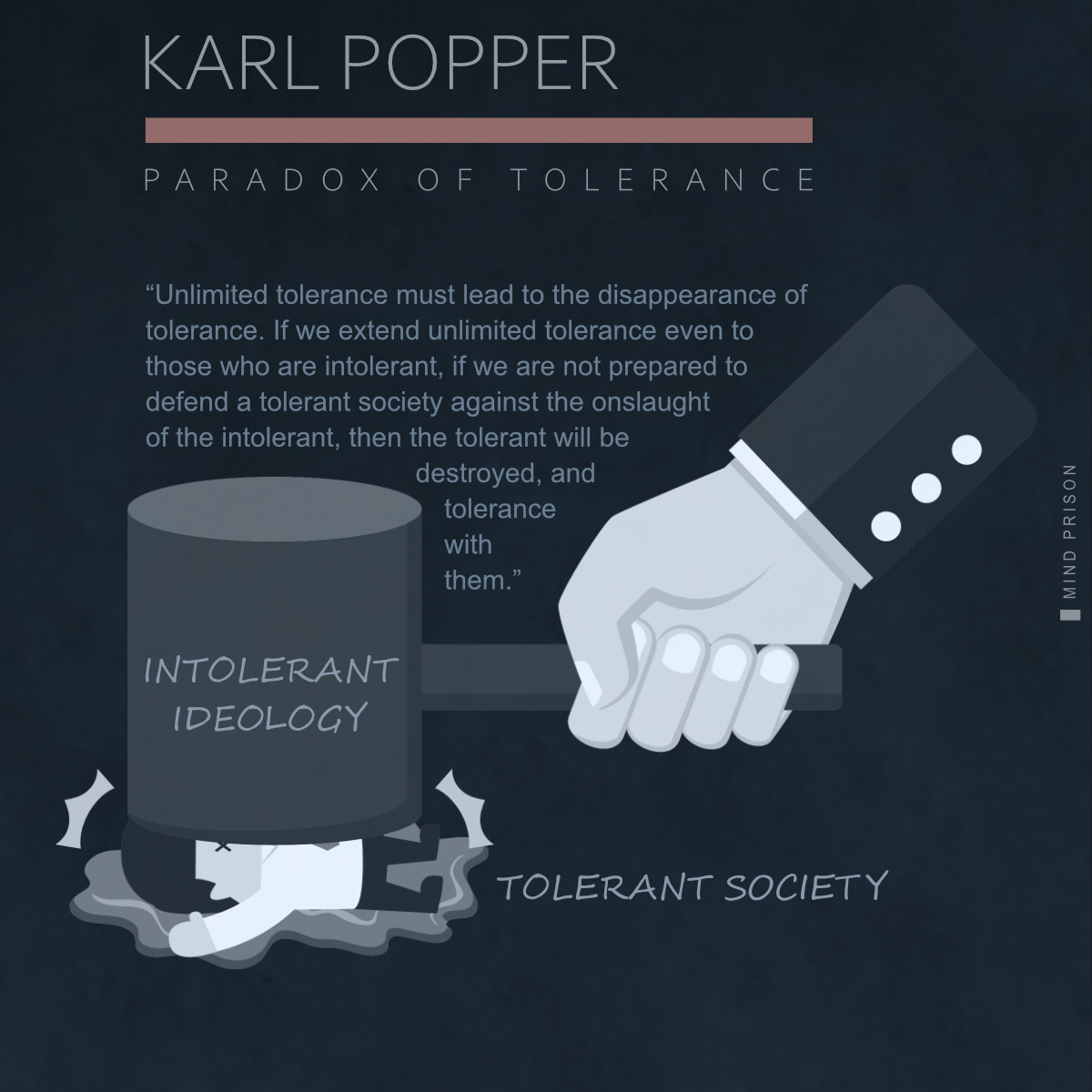
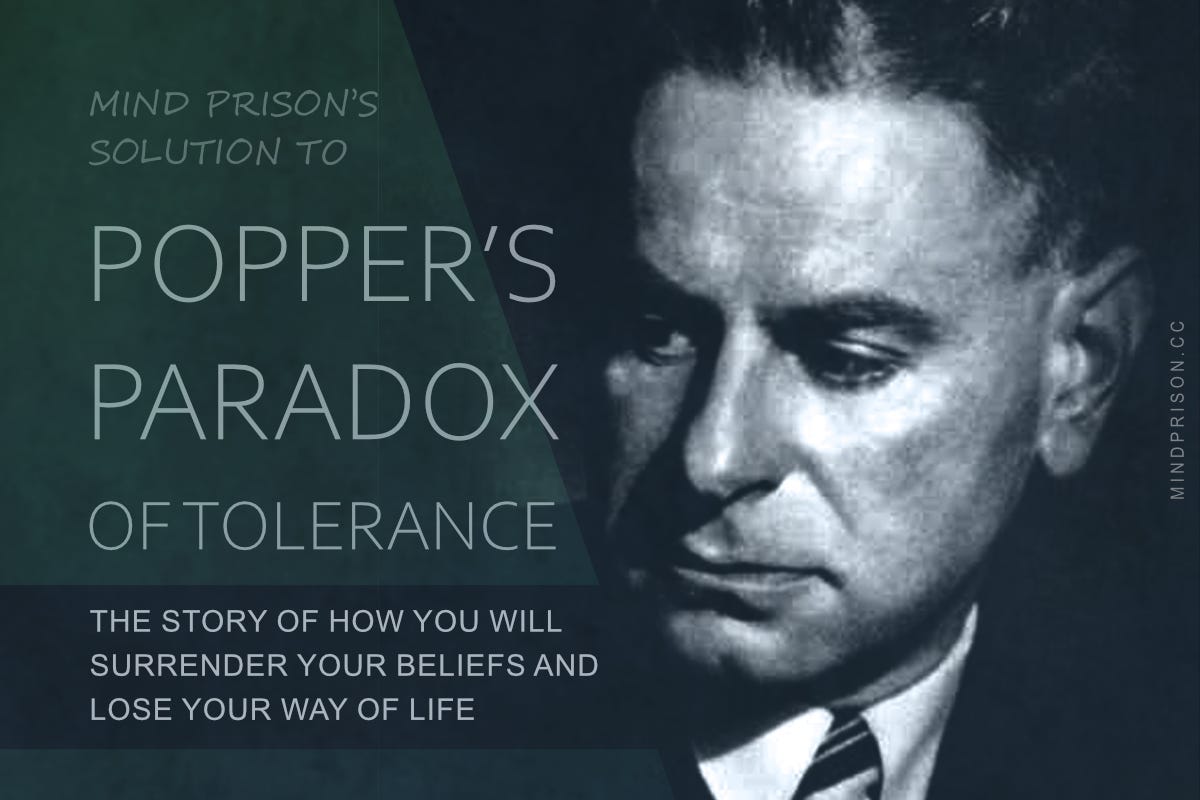
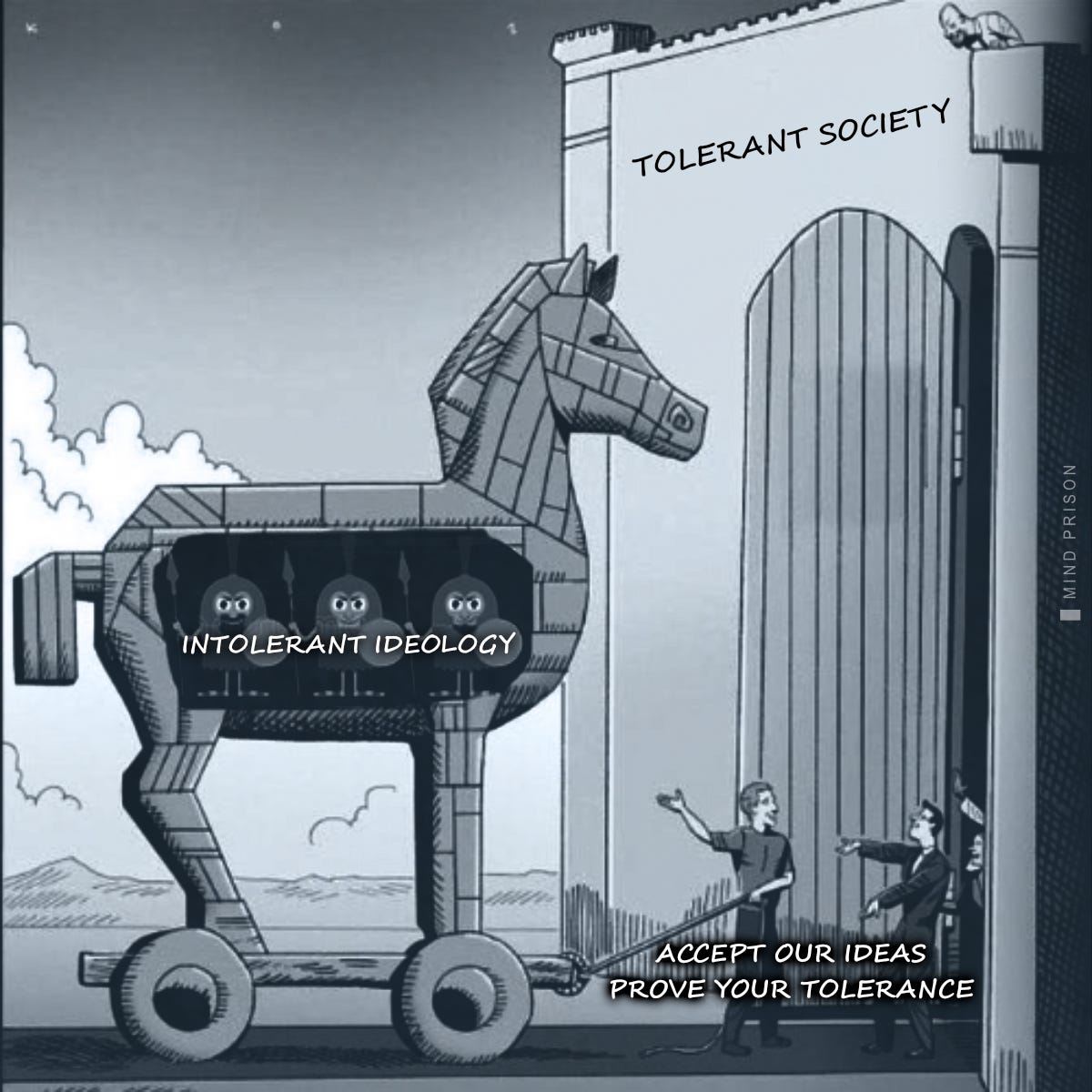
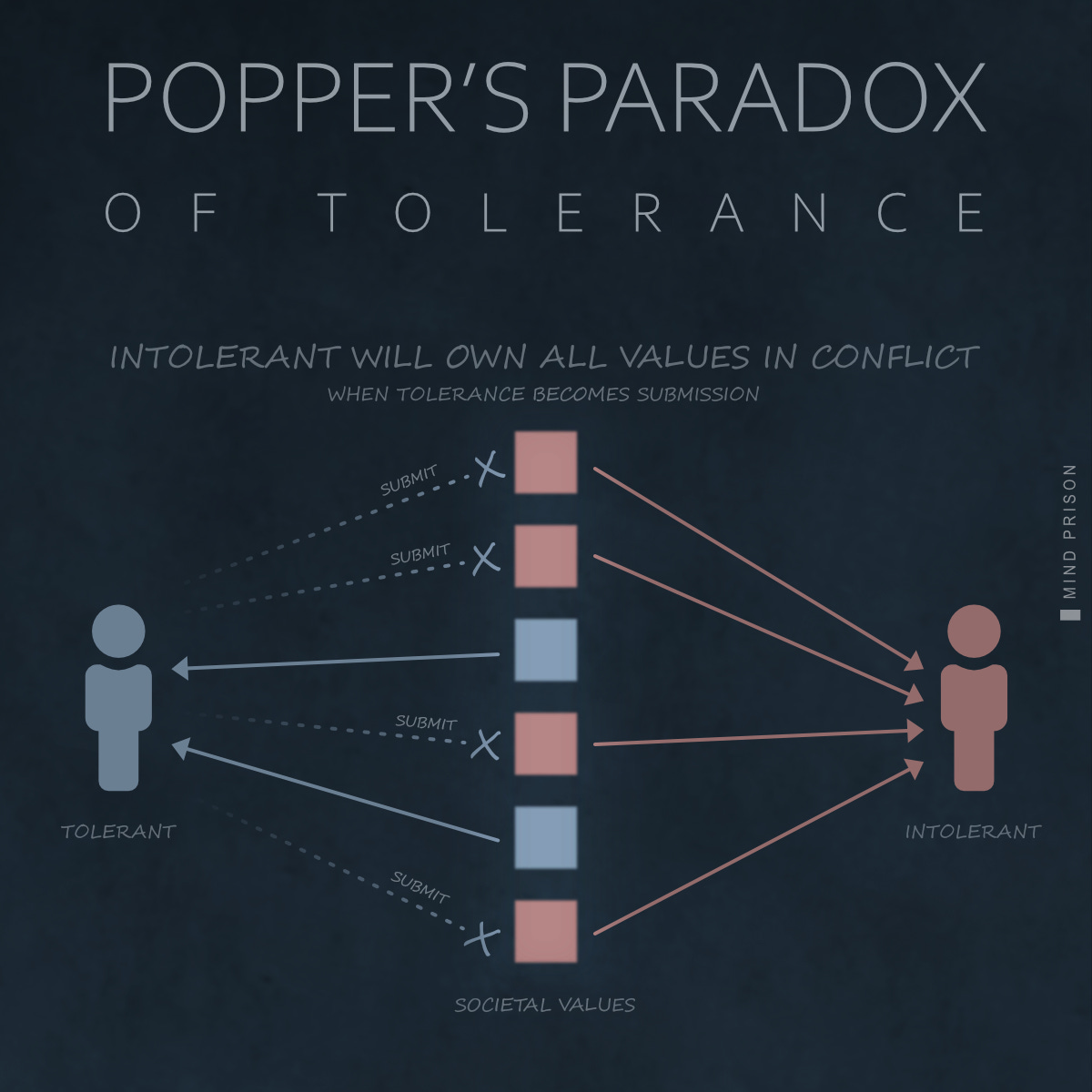
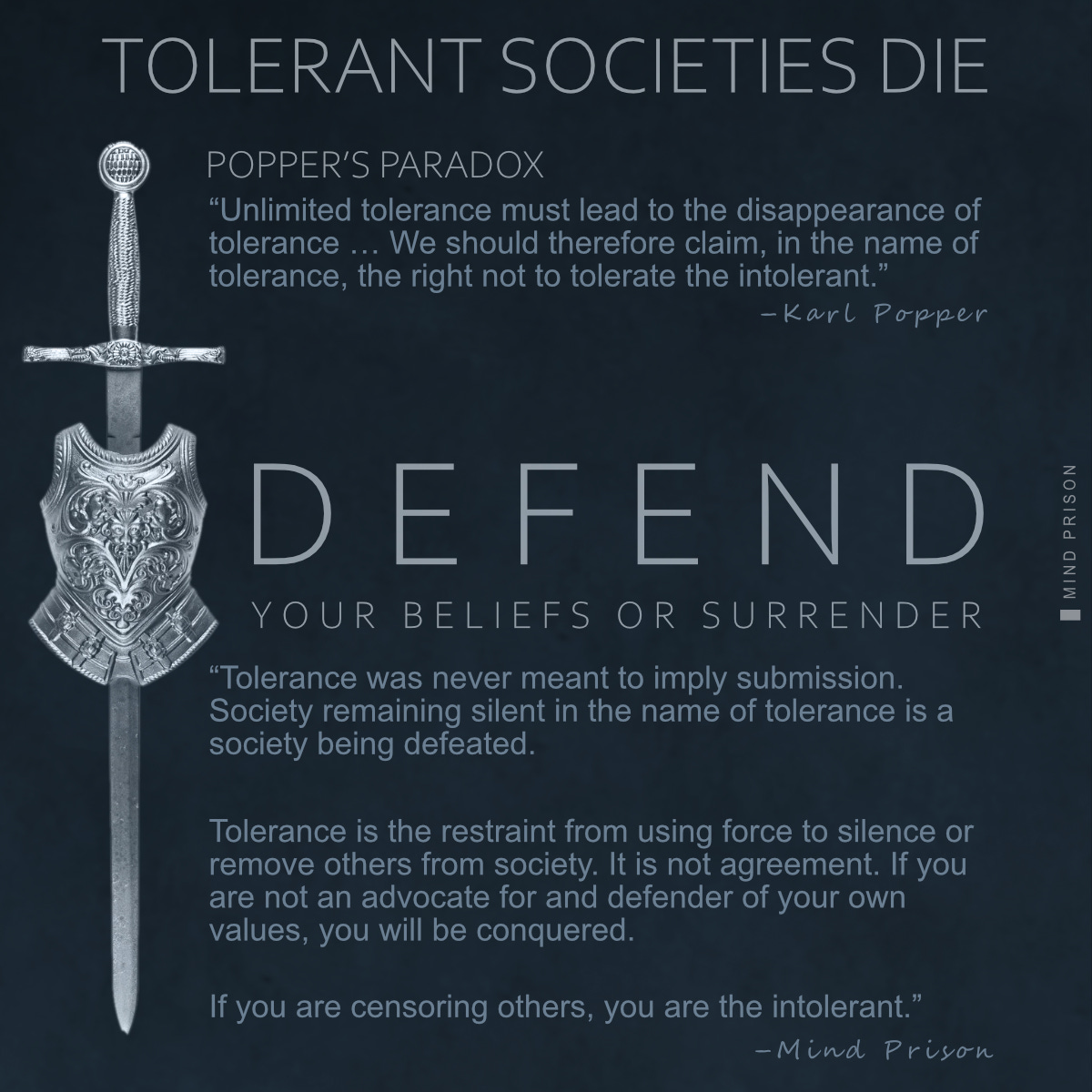
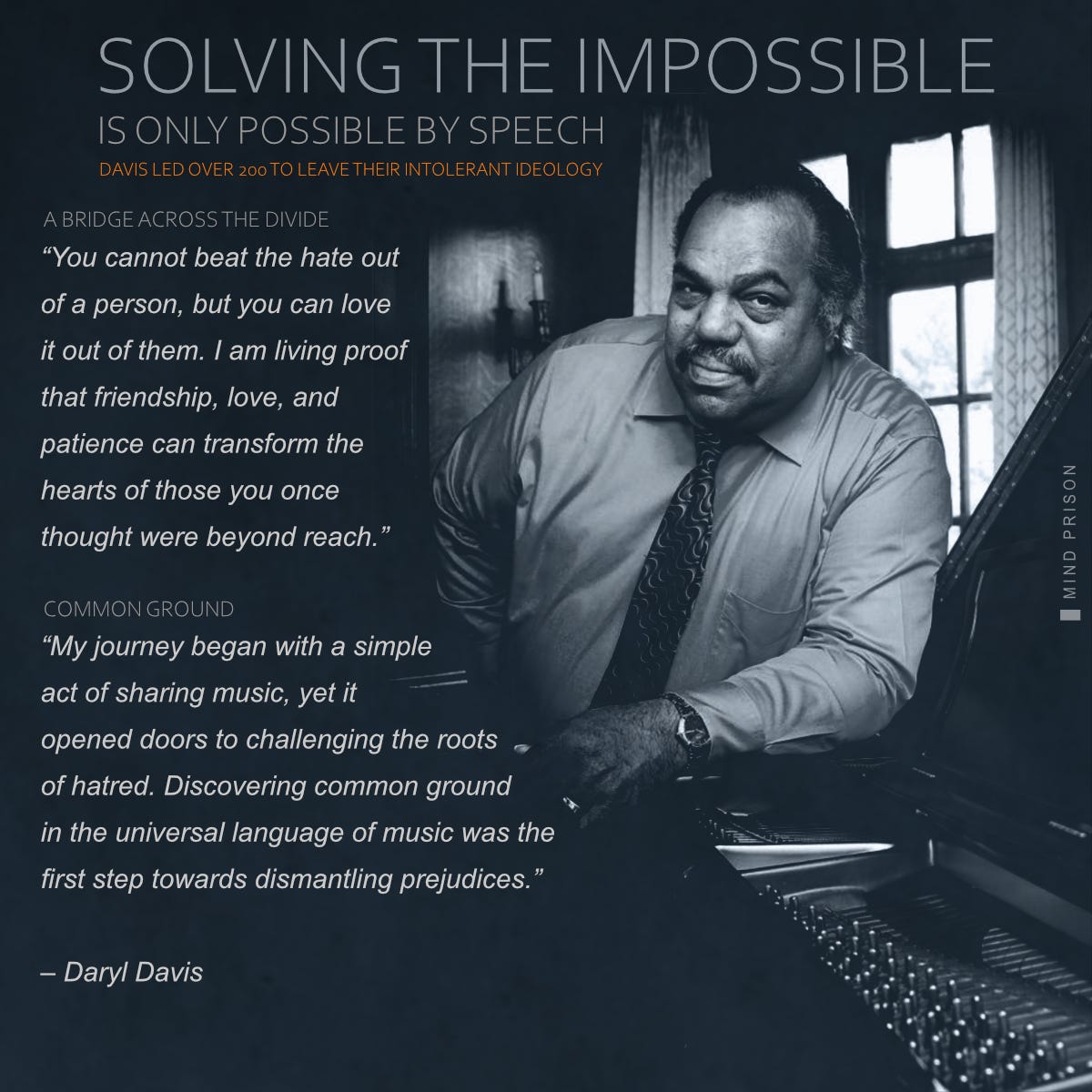
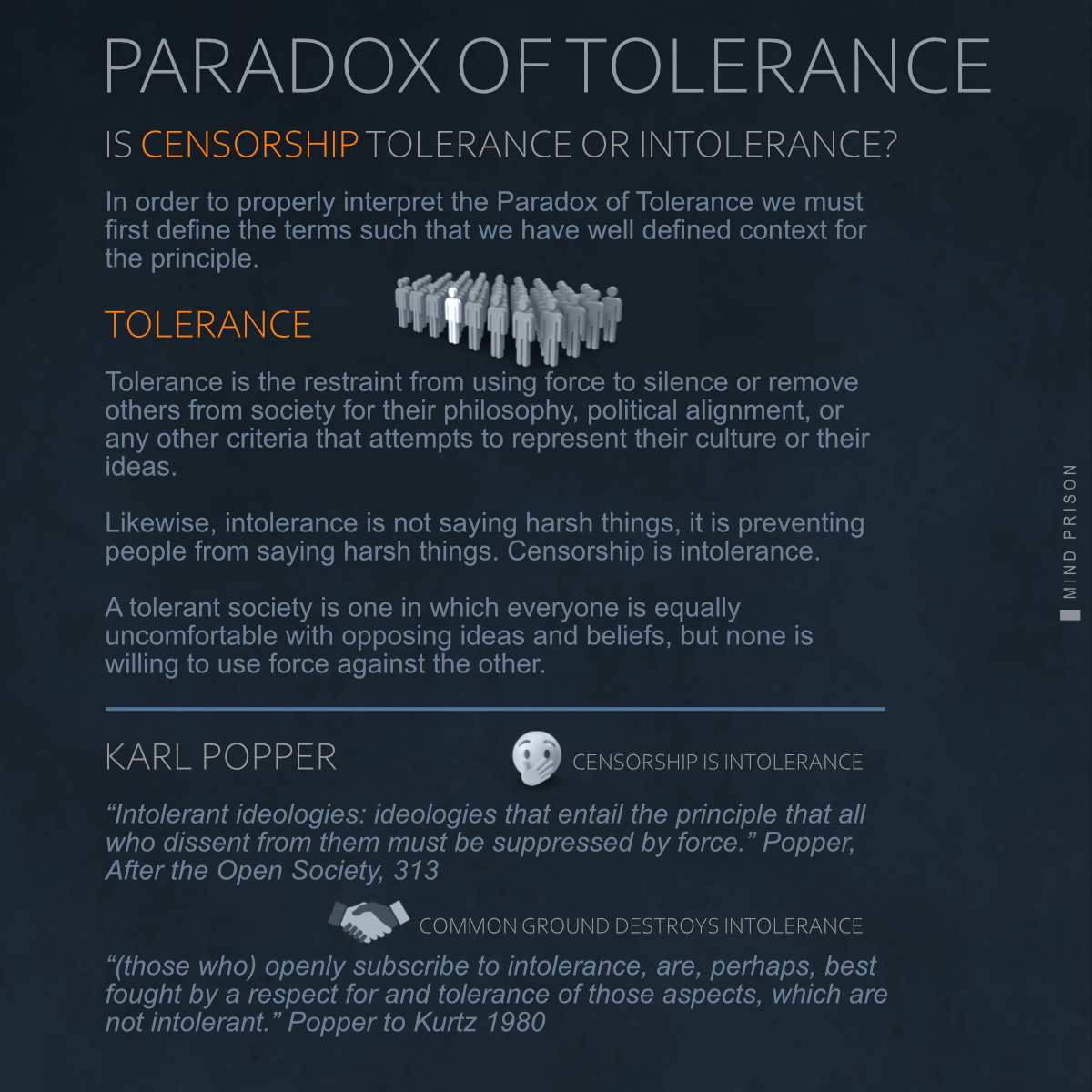
Brilliant! Thank you for this.
Great stuff! I particularly like the part where you are opposing the misguided definition of tolerance. It aligns with my own thoughts on the subject. It indeed seems that for some, tolerance is just passivity repackaged as a virtue. However, I'm not convinced that your definition of it as "restraint from using force to silence or remove others from society" is completely valid either. You don't give strong arguments why the line should be drawn right there. And it's also problematic because force is used within society and what becomes an issue now is how exactly to tell when use of force is related to intolerance and when it's not. In a way, your definition merely shifted the problem somewhere else.
Maybe it would be better to avoid this pitfall altogether and stick to defining tolerance as something that characterizes the system and not something to be strived for (or fought against). That would mirror the medical and engineering definition of the word. Tolerance would be a limit of how much society can take without breaking. Then we could discuss if today's society (as a whole) is more or less tolerant than it was in the past. And what makes it so - and I would say it is this passivity, that some argue for, that makes society more fragile and less resilient.